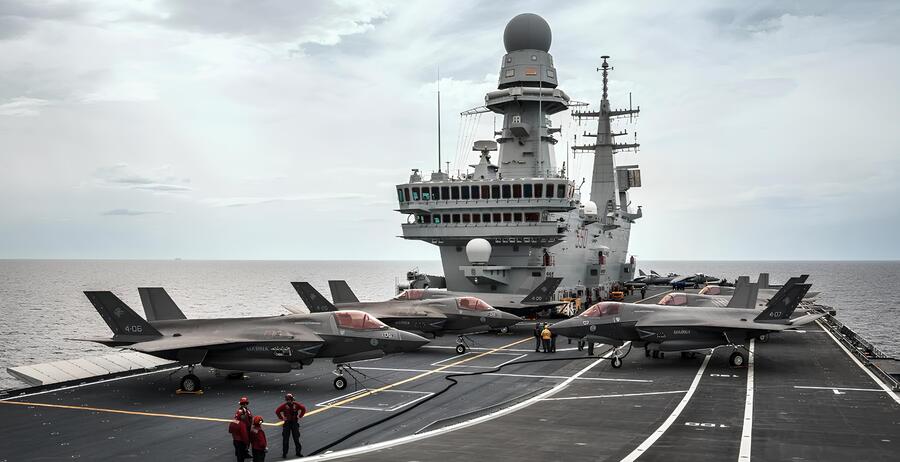World Geostrategic Insights interview with Kueth Yul, Mary Prentice, Umberto Bosna, co-authors of the American Liberty University research paper entitled “Mediterranean Security: Italian, U.S., NATO, and North African National Interests from a Geopolitical Perspective”. The interview focused on the following main issues:
Irregular Migration Challenges – The influx of irregular migrants from Africa to Europe, particularly through Italy, raises significant political and security concerns for the EU, with questions surrounding the roles of human traffickers and the capacity of North African countries to collaborate with Europe on migration control.
U.S. Role in the Mediterranean – The United States has maintained a long-standing presence in the Mediterranean, supporting initiatives like the Three Seas Initiative to enhance regional connectivity; however, questions remain about its strategic focus and the absence of Italy from this initiative.
Italy’s Energy Strategy – Italy is seeking to reduce its dependence on Russian energy by partnering with North African hydrocarbon producers and aims to establish itself as an energy hub for Europe, while also implementing the “Mattei Plan” to foster mutually beneficial cooperation with African nations to support economic development and address migration issues.

Kueth Yul is Co-Founder, Research Partner and Treasurer at the Center for African Liberty Forum and Policy Analysis (CALFPA), United States. Kueth served in several law enforcement and child welfare positions prior to co-founding CALFPA. From 2016 until 2022, he was President of the Board of Directors for the City of Goodyear, Arizona’s Department of Public Improvement Corporation/Industrial Development Authority PIC/IDA. Kueth is a Ph.D. student in Public Policy-National Security Policy at Liberty University. His research focused on reducing violence and food insecurity in Africa.
In the interview Kueth Yul addressed the following issues:
What are currently the main causes of this growing influx of irregular migrants from Africa to Europe across the Mediterranean?
KY – The history of civil wars and religious extremist violence in Africa’s Sahel region causes significant insecurity amongst the African population. And therefore, the primary causes of African immigrants’ influx to European countries crossing the Mediterranean ocean are: 1. The search for a job or education opportunity, and 2. Safety.
The lack of jobs and education opportunities amongst the young African generation is growing immensely. Many of these African youngest generations were born in the war zones, or refugee camps in the neighboring countries, where their chance for these opportunities is very limited. Due to the continued insecurity caused by civil war and extremist violence, these people choose to go elsewhere in the world to settle their life instead. Many would tell you that they rather die somewhere else, than just sitting and experiencing difficulties in their own countries or refugees’ camps.
What roles do human traffickers, mafias and other organizations involved in the immigration business play in the arrival of the growing number of irregular migrants on Italian shores?
KY – Various human traffickers, and mafias organizations have been using these young African job seekers and educational searchers as an opportunity to elevate their businesses. Some of these organizations went further and offered money to motivate many immigrants, particularly young females to be used for sex trafficking. Some young men were also lured for organs business, and many other dangerous businesses by these organizations.
Does this phenomenon pose a threat to Europe’s security? Is there a way to mitigate it?
KY – The Mediterranean region is a strategic location for many countries, including the U.S, Asia, Europe and Africa. This simply means that the current influx of immigrants through this route is a global security threat, not Europe alone. Thus, mitigating this problem requires a collective effort from all these nations. This responsibility would fall into the hands of the leaders of those nations who have interests in this region.
What should be the European policy on this issue?
KY – The European countries should reexamine their corporations and action plan policies with the African nations, and United Nations for a better solution to this problem. Precisely, they should work with African security to identify the factories that manufactured the plastic boats, and implement policies that would restrict the selling of these products to unidentified customers. Other legal restrictions shall be applied to help strengthen the policy.
Do North African countries have the political will, and capacity, to work with Europe to control the flow of irregular migrant departures to Europe?
KY – Most North African countries have already been working with the European government, and many more would agree to join the effort to control the immigration influx. However, due to the lack of strong government policies amongst these countries, those challenges might continue affecting the corporations. This again, would depend on each Country’s leadership capability, and willingness to work honestly with Europe to solve this problem.

Mary Prentice, Ph.D. is Associate Professor of Government, Liberty University. Greater Lynchburg Area, United States. Dr. Prentice has worked in diplomacy and foreign policy in the Fulbright Scholar office in DC as well as in the US Embassy in Ghana, West Africa in the political and economic sections as well as military/defense relations. She has worked for the Ford Foundation relating to higher education and culture grants in Zimbabwe. In addition, she has worked in emergency management for Leon County, FL. Dr. Prentice has taught extensively at both the undergraduate and graduate levels in international relations.
In the interview Mary Prentice addressed the following issues:
How do you assess NATO and Italy’s Role in the Mediterranean, and the 3 Seas initiative?
MP – US and Italian NATO involvement in the Mediterranean region is important, and adding Italy to the 3 Seas initiative would be a good step to positively connect the region even more. The 3 Seas Initiative focuses on building infrastructure and energy resources, and regional connectivity in Central and Eastern Europe in order to boost economic prosperity and transatlantic security.
As emphasized by Dr. James Jay Carafano, Senior Counselor to the Heritage Foundation President, at the conference “The Three Seas Initiative and Italy”, held in Rome on 18th September 2023, Italy should join the Three Seas Initiative, also because it could integrate the goal of becoming a North-South energy hub into its plan.
The transatlantic alliance NATO, as underlined by Admiral Foggo, has an important role for deterrence and defence in the Mediterranean, and to assure stability in North Africa and Eastern Mediterranean.
Developing even stronger relations between Europe, Africa and the United States is vital to promoting security in the region particularly through trade, deterrence, defense and good communication and dialogue.
What is the purpose of NATO military exercises in the Mediterranean and North Africa?
MP – It is very reassuring that NATO conducts military exercises in the Mediterranean area as well as Africa. There have been three major exercises: the Exercise Phoenix Express of 2022 was the 17th iteration of this North African maritime exercise; it occurred between May 23 – June 3, 2022, in Tunis, Tunisia, and in other areas of the Mediterranean Sea. The purpose was to test North African, European, and U.S. maritime forces’ capabilities to respond not only to irregular migration, trafficking and illegal movements of goods and material, but also to dialogue and work together.
How do you assess the military cooperation in the Mediterranean between NATO and non-NATO countries?
MP – In Phoenix Express 2022 participated Algeria, Belgium, Egypt, Greece, Italy, Libya, Malta, Mauritania, Morocco, Spain, Tunisia, United Kingdom, and the United States.
Between Feb. 12-15, 2024 in Naples the US Naval Forces Africa hosted a tabletop exercise Exercise Phoenix focusing on North Africa and the Mediterranean Sea. The US’s Sixth Fleet and the US Navy in Naples and hosted leaders from Libya, Mauritania, Morocco, Tunisia, and the United States.
The two additional exercises that involve US and Africa are OBANGAME EXPRESS and CUTLASS EXPRESS. OBANGAME EXPRESS is designed to improve regional cooperation, Maritime Domain Awareness (MDA), information-sharing practices, and tactical interdiction expertise to improve collective capabilities of Gulf of Guinea and West African nations to counter illicit maritime activity in the Gulf.
CUTLASS EXPRESS, on the other hand is designed to improve regional cooperation, Maritime Domain Awareness (MDA), and information-sharing practices to add to capabilities between the United States, East African, and West Indian Ocean nations in order counter illicit maritime activity in the West Indian Ocean.61 The EU and the African Union (AU) play important roles supporting NATO in terms of Mediterranean and border issues.
What security partnerships are emerging in the Mediterranean?
MP – The EU has already forged relations and partnerships on maritime security with the United Nations (UN), including the United Nations Office on Drugs and Crime (UNODC), the International Maritime Organization of the United Nations (IMO), NATO, the African Union (AU), and the Association of SouthEast Asian Nations (ASEAN).
The Copernicus maritime and border surveillance systems are implemented by the European Maritime Safety Agency (EMSA) through the Frontex European Border, and the Coast Guard Agency, which provide space based operations. Viewing Mediterranean security through a geopolitical lens demonstrates the importance of trade, alliance building, and communication.

Umberto Bosna – Geopolitical scholar, analyst, and strategist, specialized in geopolitics, writer and commentator, Bari, Italy.
In the interview Umberto Bosna has addressed the following issues:
How would you describe Italy’s strategy for replacing Russian hydrocarbon imports?
UB – Italy necessarily must import hydrocarbons and oil from other nations, since the Italian territory does not have enough resources for its national energy needs. Up to now the best and most economical solution has been to use hydrocarbons from the Siberian region in Russia. To replace Russian hydrocarbon and oil imports, the current Italian government has implemented the Mattei Plan, in collaboration with nations of North Africa, Central Africa and the Persian Gulf.
The plan includes the aim to help the involved countries in the extraction of hydrocarbons and oil, so as to obtain a satisfactory quantity for the Italian national need. In such a way, Italy could decrease its energy dependence on Russia, and increase its soft power in many African and Persian Gulf nations, transferring Italian technology, creating jobs for the local populations, and earning the respect and esteem of these nations rich in hydrocarbon and oil deposits.
Can Italy become an energy hub for Europe?
UB – Italy, thanks to its strategic position, at the center of the Mediterranean, is the European nation with the greatest possibilities for importing American LNG. In fact, the Italian government, led by Giorgia Meloni, would like to increase Italy’s capacity for importing and storing hydrocarbons from the United States of America and from the many African and Persian Gulf nations, with which Italy collaborates, in order to become a geostrategically important nation for the whole of Europe. All hydrocarbons entering Europe should transit through Italy and this would give Italy enormous weight in the European political and geopolitical chessboard.
To date, Italy is engaged in this enterprise, with the construction of various regasification plants in the major Italian ports. But the road to becoming the point of storage of hydrocarbons for all of Europe is still very long, and it is not certain that it will materialize.
Could the flow of irregular migrants to Italy be reduced by helping Africa’s economic development?
UB – With reference to African immigration to Italy, I think we need to reason differently, compared to energy aspects. To block or regulate migratory flows, we should have governments in North Africa, stable, strong, that respect contracts with Italy. A relevant Italian success, to reduce immigration to Europe, was achieved by the Italian government led by Silvio Berlusconi who found an agreement with Libyan leader Gaddafi. Today I think it is difficult to be able to manage these migratory flows alone, since the interlocutors have changed. In Libya now the ones making the decisions are Turkey and Russia.
Link to the research paper: Mediterranean Security: Italian, United States, NATO, and North African National Interests from a Geopolitical Perspective
Image Source: Navy Lookout (F-35s and Harriers on the deck of ITC Cavour ahead of exercise Med Strike).







